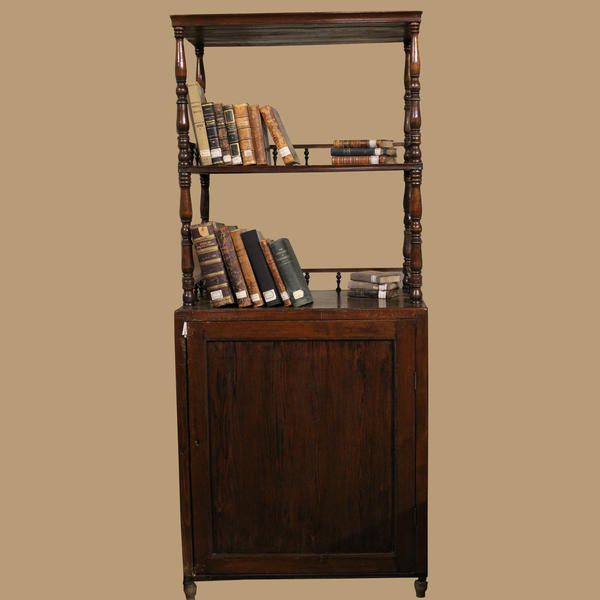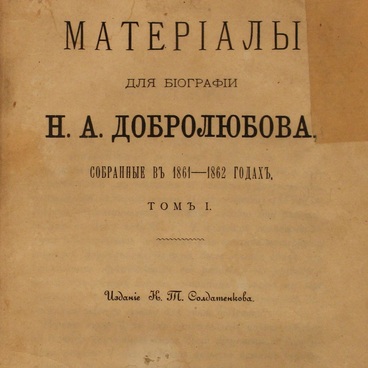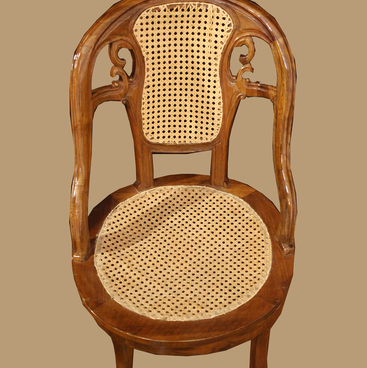Floor standing open bookcases were a popular piece of furniture in the 19th century: lightweight open work structures were used to store various items of interior. The exhibit on display is a wooden open bookcase from the Chernyshevskys’ apartment of Astrakhan and Saratov periods. Edges of the upper shelves rest on four chiseled balusters. The shelves and balusters are fastened with each other with the help of tongues. At the back and sides, the balusters are joined with horizontal partitions. The lower part of the bookcase is a small cabinet with a one-sided door. A partition divides the cabinet into two compartments. The open bookcase rests on chiseled spherical legs tapering to the floor.
For all his life, Chernyshevsky was surrounded with books. The last years of his life, spent in Astrakhan and Saratov, were no exception: contemporaries could see piles of books even on the floor. It exactly at that time that the bookcase in question appeared in his apartment. There he stored books by Georg Weber, Nikolay Nekrasov, 15 large volumes by Friedrich Arnold Brockhaus, as well as a complete series of the Sovremennik magazine for 1848-1866 presented to Chernyshevsky by Mikhailov, a Moscow acquaintance of his.
During the same months spent in Astrakhan, Chernyshevsky worked on translation of “First principles of Philosophy” by English philosopher Herbert Spencer; he started writing biographies of Nikolay Dobrolubov and Nikolay Nekrasov. His translation out of German of the General History by Weber made him financially well off.
In one of her letters, his wife Olga Sokratovna made explicit instructions for Nikolay Chernyshevsky with regard to his move from Astrakhan: “Please bring to Saratov the following: a small mirror, a writing desk, all small tables, two open bookcases, crates with crockery, father”s wardrobe, folding screens (by all means)…”
For all his life, Chernyshevsky was surrounded with books. The last years of his life, spent in Astrakhan and Saratov, were no exception: contemporaries could see piles of books even on the floor. It exactly at that time that the bookcase in question appeared in his apartment. There he stored books by Georg Weber, Nikolay Nekrasov, 15 large volumes by Friedrich Arnold Brockhaus, as well as a complete series of the Sovremennik magazine for 1848-1866 presented to Chernyshevsky by Mikhailov, a Moscow acquaintance of his.
On the following day after his arrival in Astrakhan, N.G. Chernyshevsky advised A.N. Pypin that he would work “from morning till night”. Alexander Pypin sent translation jobs to his relative: Comparative Linguistics and Primeval History by German philologist Otto Schrader and Energy in Nature by English physiologist Benjamin Carpenter.
During the same months spent in Astrakhan, Chernyshevsky worked on translation of “First principles of Philosophy” by English philosopher Herbert Spencer; he started writing biographies of Nikolay Dobrolubov and Nikolay Nekrasov. His translation out of German of the General History by Weber made him financially well off.
In one of her letters, his wife Olga Sokratovna made explicit instructions for Nikolay Chernyshevsky with regard to his move from Astrakhan: “Please bring to Saratov the following: a small mirror, a writing desk, all small tables, two open bookcases, crates with crockery, father”s wardrobe, folding screens (by all means)…”



